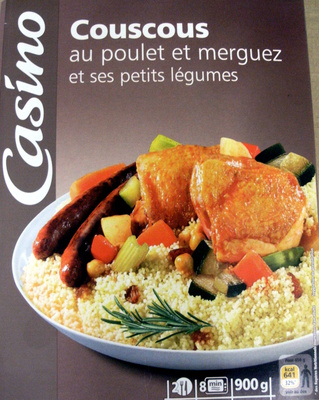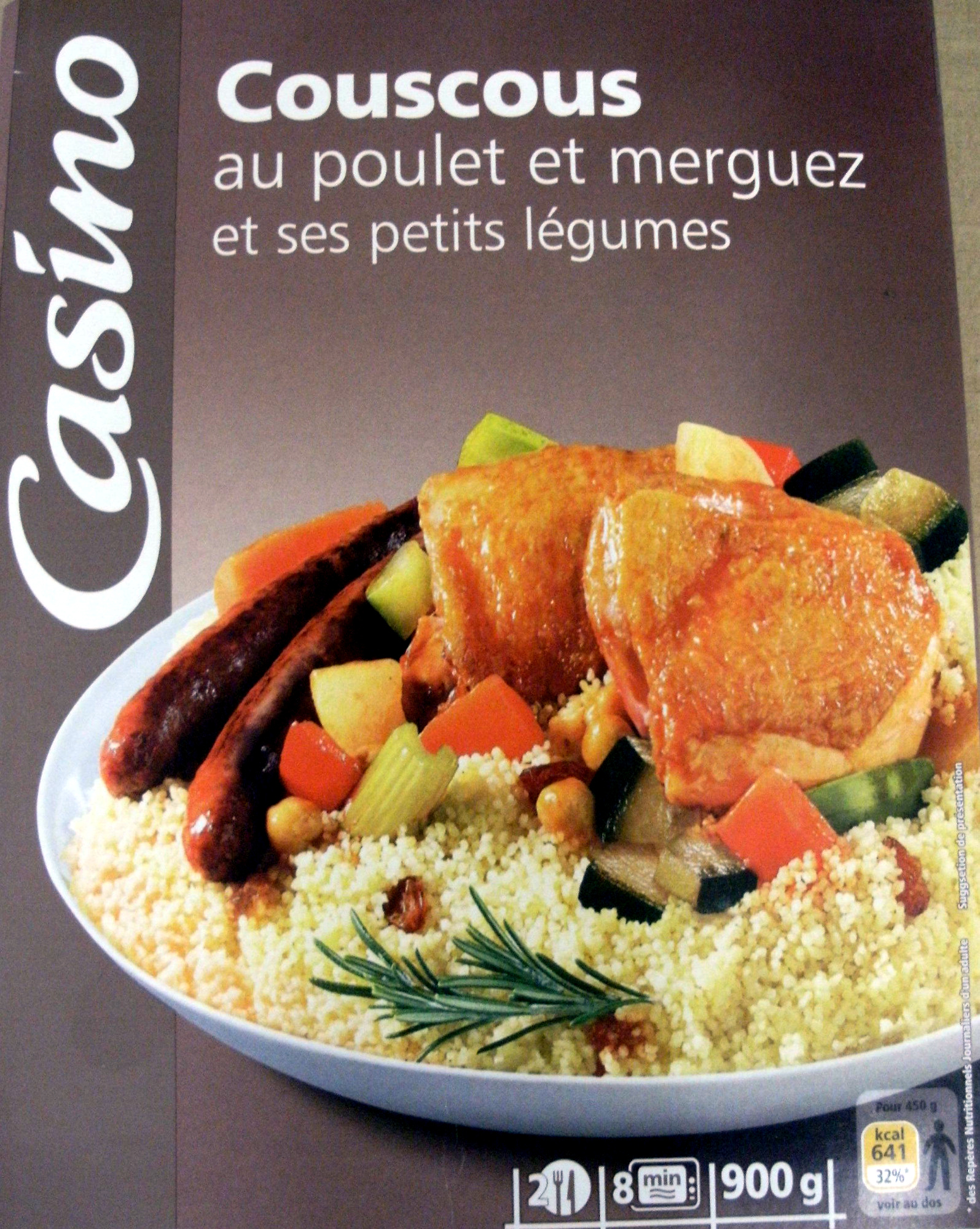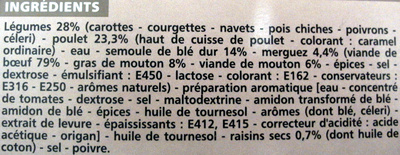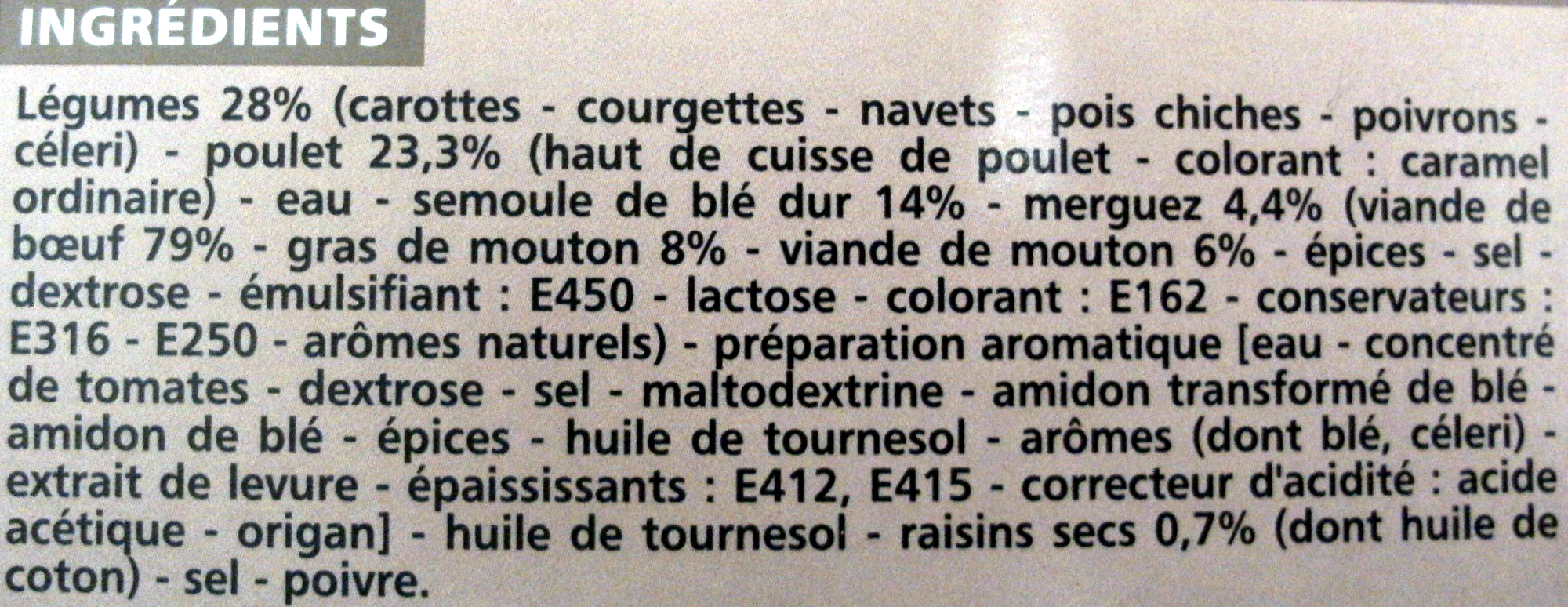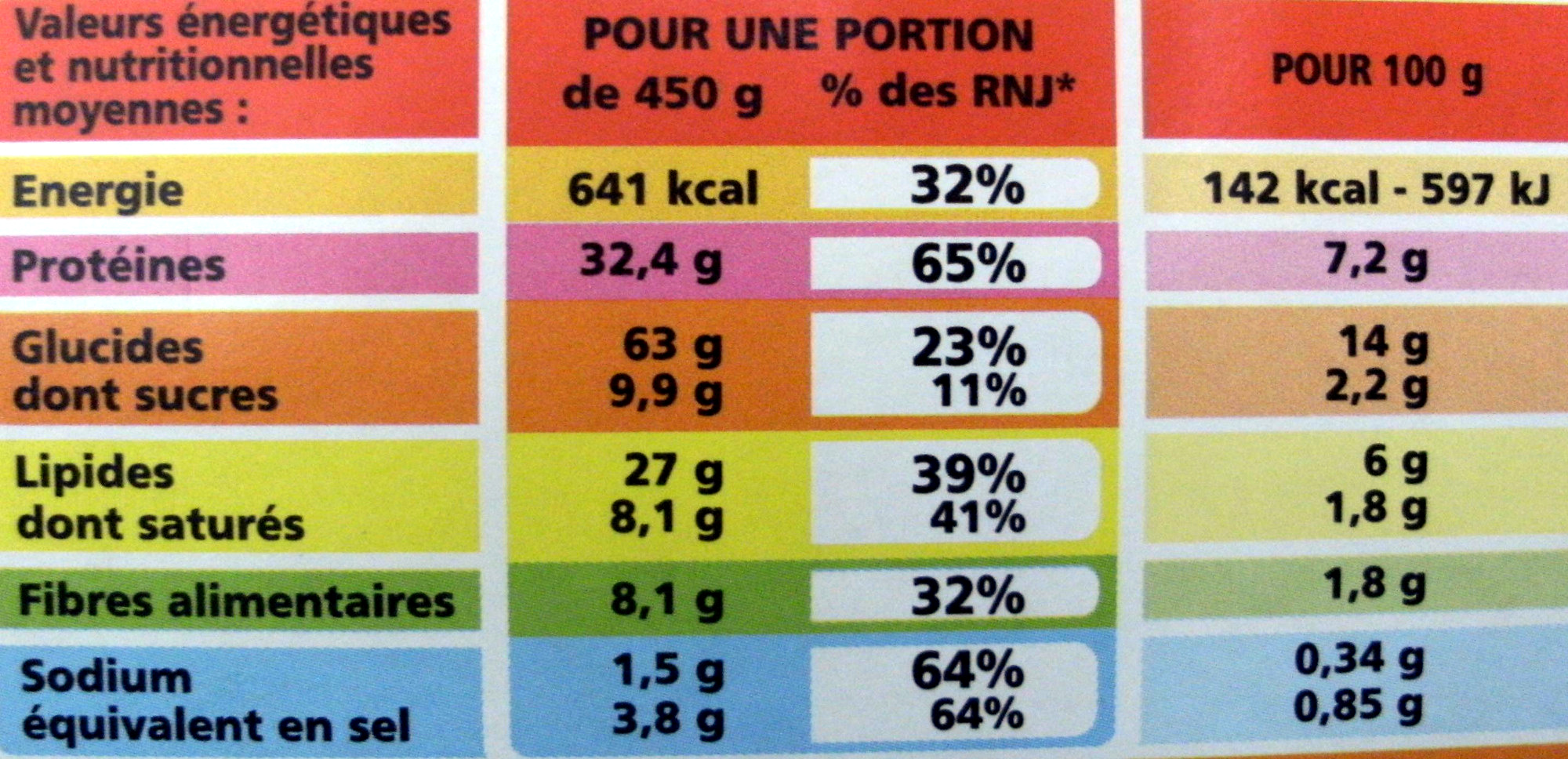Help us make food transparency the norm!
As a non-profit organization, we depend on your donations to continue informing consumers around the world about what they eat.
The food revolution starts with you!
Couscous au poulet et merguez et ses petits légumes (2 portions) - Casino - 900 g
Couscous au poulet et merguez et ses petits légumes (2 portions) - Casino - 900 g
This product page is not complete. You can help to complete it by editing it and adding more data from the photos we have, or by taking more photos using the app for Android or iPhone/iPad. Thank you!
×
Barcode: 3222473542402 (EAN / EAN-13)
Common name: Couscous au poulet et merguez et ses petits légumes
Quantity: 900 g
Brands: Casino, Groupe Casino
Categories: Meats and their products, Meals, Meals with meat, Savory semolina dishes, Poultry meals, Prepared couscous, Meals with chicken, Microwave meals
Manufacturing or processing places: Agis (Filiale Groupe Lambert Dodard Chancereul - LDC) - ZA du Clos du Poivre - Route d'Assérac - 44410 Herbignac, Loire-Atlantique, Pays de la Loire, France
Traceability code: FR 44.072.002 CE - Herbignac (Loire-Atlantique, France)
Countries where sold: France
Matching with your preferences
Health
Ingredients
-
54 ingredients
: Légumes 28 % (carottes - courgettes - navets - pois chiches - poivrons - céleri) - poulet 23,3 % (haut de cuisse de poulet - colorant : caramel ordinaire) - eau - semoule de blé dur 14 % - merguez 4,4 % (viande de bœuf 79 % - gras de mouton 8 % - viande de mouton 6 % - épices - sel - dextrose - émulsifiant : E 450 - lactose - colorant : E 162 - conservateurs : E 316 - E 250 - arômes naturels) - préparation aromatique [eau - concentre de tomates - dextrose - sel - maltodextrine - amidon transforme de blé - amidon de blé - épices - huile de tournesol - arômes (dont blé, céleri) - extrait de levure - épaississants : E 412, E 415 - correcteur d'acidité : acide acétique - origan] - huile de tournesol - raisins secs 0,7 % (dont huile de coton) - sel - poivre.Allergens: Celery, Milk
Food processing
-
Ultra processed foods
Elements that indicate the product is in the 4 - Ultra processed food and drink products group:
- Additive: E14XX - Modified Starch
- Additive: E150a - Plain caramel
- Additive: E162 - Beetroot red
- Additive: E412 - Guar gum
- Additive: E415 - Xanthan gum
- Additive: E450 - Diphosphates
- Ingredient: Colour
- Ingredient: Dextrose
- Ingredient: Emulsifier
- Ingredient: Flavouring
- Ingredient: Glucose
- Ingredient: Lactose
- Ingredient: Maltodextrin
- Ingredient: Thickener
Food products are classified into 4 groups according to their degree of processing:
- Unprocessed or minimally processed foods
- Processed culinary ingredients
- Processed foods
- Ultra processed foods
The determination of the group is based on the category of the product and on the ingredients it contains.
Additives
-
E162 - Beetroot red
Betanin: Betanin, or Beetroot Red, is a red glycosidic food dye obtained from beets; its aglycone, obtained by hydrolyzing away the glucose molecule, is betanidin. As a food additive, its E number is E162. The color of betanin depends on pH; between four and five it is bright bluish-red, becoming blue-violet as the pH increases. Once the pH reaches alkaline levels betanin degrades by hydrolysis, resulting in a yellow-brown color. Betanin is a betalain pigment, together with isobetanin, probetanin, and neobetanin. Other pigments contained in beet are indicaxanthin and vulgaxanthins.Source: Wikipedia
-
E250 - Sodium nitrite
Sodium nitrite: Sodium nitrite is the inorganic compound with the chemical formula NaNO2. It is a white to slightly yellowish crystalline powder that is very soluble in water and is hygroscopic. It is a useful precursor to a variety of organic compounds, such as pharmaceuticals, dyes, and pesticides, but it is probably best known as a food additive to prevent botulism. It is on the World Health Organization's List of Essential Medicines, the most important medications needed in a basic health system.Nitrate or nitrite -ingested- under conditions that result in endogenous nitrosation has been classified as "probably carcinogenic to humans" by International Agency for Research on Cancer -IARC-.Source: Wikipedia
-
E260 - Acetic acid
Acetic acid: Acetic acid , systematically named ethanoic acid , is a colorless liquid organic compound with the chemical formula CH3COOH -also written as CH3CO2H or C2H4O2-. When undiluted, it is sometimes called glacial acetic acid. Vinegar is no less than 4% acetic acid by volume, making acetic acid the main component of vinegar apart from water. Acetic acid has a distinctive sour taste and pungent smell. In addition to household vinegar, it is mainly produced as a precursor to polyvinyl acetate and cellulose acetate. It is classified as a weak acid since it only partially dissociates in solution, but concentrated acetic acid is corrosive and can attack the skin. Acetic acid is the second simplest carboxylic acid -after formic acid-. It consists of a methyl group attached to a carboxyl group. It is an important chemical reagent and industrial chemical, used primarily in the production of cellulose acetate for photographic film, polyvinyl acetate for wood glue, and synthetic fibres and fabrics. In households, diluted acetic acid is often used in descaling agents. In the food industry, acetic acid is controlled by the food additive code E260 as an acidity regulator and as a condiment. In biochemistry, the acetyl group, derived from acetic acid, is fundamental to all forms of life. When bound to coenzyme A, it is central to the metabolism of carbohydrates and fats. The global demand for acetic acid is about 6.5 million metric tons per year -Mt/a-, of which approximately 1.5 Mt/a is met by recycling; the remainder is manufactured from methanol. Vinegar is mostly dilute acetic acid, often produced by fermentation and subsequent oxidation of ethanol.Source: Wikipedia
-
E316 - Sodium erythorbate
Sodium erythorbate: Sodium erythorbate -C6H7NaO6- is a food additive used predominantly in meats, poultry, and soft drinks. Chemically, it is the sodium salt of erythorbic acid. When used in processed meat such as hot dogs and beef sticks, it increases the rate at which nitrite reduces to nitric oxide, thus facilitating a faster cure and retaining the pink coloring. As an antioxidant structurally related to vitamin C, it helps improve flavor stability and prevents the formation of carcinogenic nitrosamines. When used as a food additive, its E number is E316. The use of erythorbic acid and sodium erythorbate as a food preservative has increased greatly since the U.S. Food and Drug Administration banned the use of sulfites as preservatives in foods intended to be eaten fresh -such as ingredients for fresh salads- and as food processors have responded to the fact that some people are allergic to sulfites. It can also be found in bologna, and is occasionally used in beverages, baked goods, and potato salad.Sodium erythorbate is produced from sugars derived from different sources, such as beets, sugar cane, and corn. An urban myth claims that sodium erythorbate is made from ground earthworms; however, there is no truth to the myth. It is thought that the genesis of the legend comes from the similarity of the chemical name to the words earthworm and bait.Alternative applications include the development of additives that could be utilized as anti-oxidants in general. For instance, this substance has been implemented in the development of corrosion inhibitors for metals and it has been implemented in active packaging.Sodium erythorbate is soluble in water. The pH of the aqueous solution of the sodium salt is between 5 and 6. A 10% solution, made from commercial grade sodium erythorbate, may have a pH of 7.2 to 7.9. In its dry, crystalline state it is nonreactive. But, when in solution with water it readily reacts with atmospheric oxygen and other oxidizing agents, which makes it a valuable antioxidant.Source: Wikipedia
-
E412 - Guar gum
Guar gum (E412) is a natural food additive derived from guar beans.
This white, odorless powder is valued for its remarkable thickening and stabilizing properties, making it a common ingredient in various food products, including sauces, dressings, and ice creams.
When used in moderation, guar gum is considered safe for consumption, with no known adverse health effects.
-
E415 - Xanthan gum
Xanthan gum (E415) is a natural polysaccharide derived from fermented sugars, often used in the food industry as a thickening and stabilizing agent.
This versatile food additive enhances texture and prevents ingredient separation in a wide range of products, including salad dressings, sauces, and gluten-free baked goods.
It is considered safe for consumption even at high intake amounts.
-
E450 - Diphosphates
Diphosphates (E450) are food additives often utilized to modify the texture of products, acting as leavening agents in baking and preventing the coagulation of canned food.
These salts can stabilize whipped cream and are also found in powdered products to maintain their flow properties. They are commonly present in baked goods, processed meats, and soft drinks.
Derived from phosphoric acid, they're part of our daily phosphate intake, which often surpasses recommended levels due to the prevalence of phosphates in processed foods and drinks.
Excessive phosphate consumption is linked to health issues, such as impaired kidney function and weakened bone health. Though diphosphates are generally regarded as safe when consumed within established acceptable daily intakes, it's imperative to monitor overall phosphate consumption to maintain optimal health.
Ingredients analysis
-
May contain palm oil
Ingredients that may contain palm oil: Sheeps fat
-
Non-vegan
Non-vegan ingredients: Chicken, fr:Haut de cuisse de poulet, Merguez, Beef meat, Sheeps fat, Mutton, Lactose
-
Non-vegetarian
Non-vegetarian ingredients: Chicken, fr:Haut de cuisse de poulet, Merguez, Beef meat, Sheeps fat, Mutton
-
Details of the analysis of the ingredients
: Légumes 28% (carottes, courgettes, navets, pois chiches, poivrons, céleri), poulet 23.3% (haut de cuisse de poulet, colorant (caramel ordinaire)), eau, semoule de blé dur 14%, merguez 4.4% (viande de bœuf 3.476%, gras de mouton 0.352%, viande de mouton 0.264%, épices, sel, dextrose, émulsifiant (e450), lactose, colorant (e162), conservateurs (e316), e250, arômes naturels), préparation aromatique (eau, concentre de tomates, dextrose, sel, maltodextrine, amidon transforme de blé, amidon de blé, épices, huile de tournesol, arômes (dont blé, céleri), extrait de levure, épaississants (e412), e415, correcteur d'acidité (acide acétique), origan), huile de tournesol, raisins secs 0.7% (dont huile de coton), sel, poivre- Légumes -> en:vegetable - vegan: yes - vegetarian: yes - percent_min: 28 - percent: 28 - percent_max: 28
- carottes -> en:carrot - vegan: yes - vegetarian: yes - ciqual_food_code: 20009 - percent_min: 4.66666666666667 - percent_max: 28
- courgettes -> en:courgette - vegan: yes - vegetarian: yes - ciqual_food_code: 20020 - percent_min: 0 - percent_max: 14
- navets -> en:turnip - vegan: yes - vegetarian: yes - ciqual_food_code: 20064 - percent_min: 0 - percent_max: 9.33333333333333
- pois chiches -> en:chickpea - vegan: yes - vegetarian: yes - ciqual_food_code: 20532 - percent_min: 0 - percent_max: 7
- poivrons -> en:bell-pepper - vegan: yes - vegetarian: yes - ciqual_food_code: 20041 - percent_min: 0 - percent_max: 5.6
- céleri -> en:celery - vegan: yes - vegetarian: yes - ciqual_proxy_food_code: 20055 - percent_min: 0 - percent_max: 4.66666666666667
- poulet -> en:chicken - vegan: no - vegetarian: no - percent_min: 23.3 - percent: 23.3 - percent_max: 23.3
- haut de cuisse de poulet -> fr:haut-de-cuisse-de-poulet - vegan: no - vegetarian: no - ciqual_food_code: 36005 - percent_min: 11.65 - percent_max: 23.3
- colorant -> en:colour - percent_min: 0 - percent_max: 11.65
- caramel ordinaire -> en:e150a - vegan: yes - vegetarian: yes - percent_min: 0 - percent_max: 11.65
- eau -> en:water - vegan: yes - vegetarian: yes - ciqual_food_code: 18066 - percent_min: 19.4 - percent_max: 23.3
- semoule de blé dur -> en:durum-wheat-semolina - vegan: yes - vegetarian: yes - ciqual_food_code: 9610 - percent_min: 14 - percent: 14 - percent_max: 14
- merguez -> en:merguez - vegan: no - vegetarian: no - ciqual_food_code: 30150 - percent_min: 4.4 - percent: 4.4 - percent_max: 4.4
- viande de bœuf -> en:beef-meat - vegan: no - vegetarian: no - ciqual_proxy_food_code: 6101 - percent_min: 3.476 - percent: 3.476 - percent_max: 3.476
- gras de mouton -> en:sheeps-fat - vegan: no - vegetarian: no - from_palm_oil: maybe - percent_min: 0.352 - percent: 0.352 - percent_max: 0.352
- viande de mouton -> en:mutton - vegan: no - vegetarian: no - percent_min: 0.264 - percent: 0.264 - percent_max: 0.264
- épices -> en:spice - vegan: yes - vegetarian: yes - percent_min: 0 - percent_max: 0.264
- sel -> en:salt - vegan: yes - vegetarian: yes - ciqual_food_code: 11058 - percent_min: 0 - percent_max: 0.264
- dextrose -> en:dextrose - vegan: yes - vegetarian: yes - ciqual_proxy_food_code: 31016 - percent_min: 0 - percent_max: 0.143
- émulsifiant -> en:emulsifier - percent_min: 0 - percent_max: 0.143
- e450 -> en:e450 - vegan: yes - vegetarian: yes - percent_min: 0 - percent_max: 0.143
- lactose -> en:lactose - vegan: no - vegetarian: yes - percent_min: 0 - percent_max: 0.143
- colorant -> en:colour - percent_min: 0 - percent_max: 0.143
- e162 -> en:e162 - vegan: yes - vegetarian: yes - percent_min: 0 - percent_max: 0.143
- conservateurs -> en:preservative - percent_min: 0 - percent_max: 0.143
- e316 -> en:e316 - vegan: yes - vegetarian: yes - percent_min: 0 - percent_max: 0.143
- e250 -> en:e250 - vegan: yes - vegetarian: yes - percent_min: 0 - percent_max: 0.143
- arômes naturels -> en:natural-flavouring - vegan: maybe - vegetarian: maybe - percent_min: 0 - percent_max: 0.143
- préparation aromatique -> en:flavouring-preparation - vegan: maybe - vegetarian: maybe - percent_min: 1.4 - percent_max: 4.4
- eau -> en:water - vegan: yes - vegetarian: yes - ciqual_food_code: 18066 - percent_min: 0 - percent_max: 4.4
- concentre de tomates -> en:tomato-concentrate - vegan: yes - vegetarian: yes - ciqual_food_code: 20068 - percent_min: 0 - percent_max: 2.2
- dextrose -> en:dextrose - vegan: yes - vegetarian: yes - ciqual_proxy_food_code: 31016 - percent_min: 0 - percent_max: 1.46666666666667
- sel -> en:salt - vegan: yes - vegetarian: yes - ciqual_food_code: 11058 - percent_min: 0 - percent_max: 0.85
- maltodextrine -> en:maltodextrin - vegan: yes - vegetarian: yes - percent_min: 0 - percent_max: 0.85
- amidon transforme de blé -> en:modified-wheat-starch - vegan: yes - vegetarian: yes - ciqual_proxy_food_code: 9510 - percent_min: 0 - percent_max: 0.733333333333333
- amidon de blé -> en:wheat-starch - vegan: yes - vegetarian: yes - ciqual_proxy_food_code: 9510 - percent_min: 0 - percent_max: 0.628571428571429
- épices -> en:spice - vegan: yes - vegetarian: yes - percent_min: 0 - percent_max: 0.55
- huile de tournesol -> en:sunflower-oil - vegan: yes - vegetarian: yes - from_palm_oil: no - ciqual_food_code: 17440 - percent_min: 0 - percent_max: 0.488888888888889
- arômes -> en:flavouring - vegan: maybe - vegetarian: maybe - percent_min: 0 - percent_max: 0.44
- dont blé -> en:wheat - vegan: yes - vegetarian: yes - ciqual_proxy_food_code: 9410 - percent_min: 0 - percent_max: 0.44
- céleri -> en:celery - vegan: yes - vegetarian: yes - ciqual_proxy_food_code: 20055 - percent_min: 0 - percent_max: 0.22
- extrait de levure -> en:yeast-extract - vegan: yes - vegetarian: yes - percent_min: 0 - percent_max: 0.44
- épaississants -> en:thickener - percent_min: 0 - percent_max: 0.366666666666667
- e412 -> en:e412 - vegan: yes - vegetarian: yes - percent_min: 0 - percent_max: 0.366666666666667
- e415 -> en:e415 - vegan: yes - vegetarian: yes - percent_min: 0 - percent_max: 0.338461538461538
- correcteur d'acidité -> en:acidity-regulator - percent_min: 0 - percent_max: 0.338461538461538
- acide acétique -> en:e260 - vegan: yes - vegetarian: yes - percent_min: 0 - percent_max: 0.338461538461538
- origan -> en:oregano - vegan: yes - vegetarian: yes - ciqual_proxy_food_code: 11035 - percent_min: 0 - percent_max: 0.338461538461538
- huile de tournesol -> en:sunflower-oil - vegan: yes - vegetarian: yes - from_palm_oil: no - ciqual_food_code: 17440 - percent_min: 0.7 - percent_max: 4.4
- raisins secs -> en:raisin - vegan: yes - vegetarian: yes - ciqual_food_code: 13046 - percent_min: 0.7 - percent: 0.7 - percent_max: 0.7
- dont huile de coton -> en:cottonseed-oil - vegan: yes - vegetarian: yes - from_palm_oil: no - ciqual_food_code: 17170 - percent_min: 0.7 - percent_max: 0.7
- sel -> en:salt - vegan: yes - vegetarian: yes - ciqual_food_code: 11058 - percent_min: 0 - percent_max: 0.7
- poivre -> en:pepper - vegan: yes - vegetarian: yes - percent_min: 0 - percent_max: 0.7
- Légumes -> en:vegetable - vegan: yes - vegetarian: yes - percent_min: 28 - percent: 28 - percent_max: 28
Nutrition
-
Very good nutritional quality
This product is not considered a beverage for the calculation of the Nutri-Score.
Positive points: 5
- Proteins: 4 / 5 (value: 7.2, rounded value: 7.2)
- Fiber: 1 / 5 (value: 1.8, rounded value: 1.8)
- Fruits, vegetables, nuts, and colza/walnut/olive oils: 0 / 5 (value: 28, rounded value: 28)
Negative points: 4
- Energy: 0 / 10 (value: 142, rounded value: 142)
- Sugars: 0 / 10 (value: 2.2, rounded value: 2.2)
- Saturated fat: 1 / 10 (value: 1.8, rounded value: 1.8)
- Sodium: 3 / 10 (value: 340, rounded value: 340)
The points for proteins are counted because the negative points are less than 11.
Nutritional score: (4 - 5)
Nutri-Score:
-
Nutrient levels
-
Fat in moderate quantity (6%)
What you need to know- A high consumption of fat, especially saturated fats, can raise cholesterol, which increases the risk of heart diseases.
Recommendation: Limit the consumption of fat and saturated fat- Choose products with lower fat and saturated fat content.
-
Saturated fat in moderate quantity (1.8%)
What you need to know- A high consumption of fat, especially saturated fats, can raise cholesterol, which increases the risk of heart diseases.
Recommendation: Limit the consumption of fat and saturated fat- Choose products with lower fat and saturated fat content.
-
Sugars in low quantity (2.2%)
What you need to know- A high consumption of sugar can cause weight gain and tooth decay. It also augments the risk of type 2 diabetes and cardio-vascular diseases.
Recommendation: Limit the consumption of sugar and sugary drinks- Sugary drinks (such as sodas, fruit beverages, and fruit juices and nectars) should be limited as much as possible (no more than 1 glass a day).
- Choose products with lower sugar content and reduce the consumption of products with added sugars.
-
Salt in moderate quantity (0.85%)
What you need to know- A high consumption of salt (or sodium) can cause raised blood pressure, which can increase the risk of heart disease and stroke.
- Many people who have high blood pressure do not know it, as there are often no symptoms.
- Most people consume too much salt (on average 9 to 12 grams per day), around twice the recommended maximum level of intake.
Recommendation: Limit the consumption of salt and salted food- Reduce the quantity of salt used when cooking, and don't salt again at the table.
- Limit the consumption of salty snacks and choose products with lower salt content.
-
-
Nutrition facts
Nutrition facts As sold
for 100 g / 100 mlAs sold
per serving (450 g)Compared to: Prepared couscous Energy 142 kj
(34 kcal)639 kj
(153 kcal)-79% Fat 6 g 27 g +39% Saturated fat 1.8 g 8.1 g +67% Carbohydrates 14 g 63 g -33% Sugars 2.2 g 9.9 g -6% Fiber 1.8 g 8.1 g -24% Proteins 7.2 g 32.4 g - Salt 0.85 g 3.83 g +11% Fruits‚ vegetables‚ nuts and rapeseed‚ walnut and olive oils 28 % 28 % +12% Fruits‚ vegetables‚ nuts and rapeseed‚ walnut and olive oils (estimate from ingredients list analysis) 29.426 % 29.426 % Carbon footprint from meat or fish 2,828.2 g 12,700 g
Environment
-
Eco-Score D - High environmental impact
⚠ ️Select a country in order to include the full impact of transportation.The Eco-Score is an experimental score that summarizes the environmental impacts of food products.→ The Eco-Score was initially developped for France and it is being extended to other European countries. The Eco-Score formula is subject to change as it is regularly improved to make it more precise and better suited to each country.Life cycle analysis
-
Average impact of products of the same category: C (Score: 42/100)
Category: Chicken, Basque style
Category: Chicken, Basque style
- PEF environmental score: 0.69 (the lower the score, the lower the impact)
- including impact on climate change: 5.17 kg CO2 eq/kg of product
Stage Impact Agriculture
77.8 %Processing
14.2 %Packaging
2.3 %Transportation
3.4 %Distribution
1.3 %Consumption
0.9 %
Bonuses and maluses
-
Missing origins of ingredients information
Malus: -5
⚠ ️ The origins of the ingredients of this product are not indicated.
If they are indicated on the packaging, you can modify the product sheet and add them.
If you are the manufacturer of this product, you can send us the information with our free platform for producers.
-
Packaging with a low impact
Malus: -1
Shape Material Recycling Impact Box Cardboard Low
Eco-Score for this product
-
Impact for this product: D (Score: 36/100)
Product: Couscous au poulet et merguez et ses petits légumes (2 portions) - Casino - 900 g
Life cycle analysis score: 42
Sum of bonuses and maluses: -6
Final score: 36/100
-
Carbon footprint
-
Equal to driving 2.7 km in a petrol car
517 g CO² per 100g of product
The carbon emission figure comes from ADEME's Agribalyse database, for the category: Chicken, Basque style (Source: ADEME Agribalyse Database)
Stage Impact Agriculture
72.0 %Processing
17.7 %Packaging
3.6 %Transportation
5.7 %Distribution
0.7 %Consumption
0.3 %
Packaging
-
Packaging with a low impact
-
Packaging parts
Box (Cardboard)
-
Packaging materials
Material % Packaging weight Packaging weight per 100 g of product Paper or cardboard
-
Transportation
-
Origins of ingredients
Missing origins of ingredients information
⚠ ️ The origins of the ingredients of this product are not indicated.
If they are indicated on the packaging, you can modify the product sheet and add them.
If you are the manufacturer of this product, you can send us the information with our free platform for producers.Add the origins of ingredients for this product Add the origins of ingredients for this product
Report a problem
-
Incomplete or incorrect information?
Category, labels, ingredients, allergens, nutritional information, photos etc.
If the information does not match the information on the packaging, please complete or correct it. Open Food Facts is a collaborative database, and every contribution is useful for all.
Data sources
Product added on by openfoodfacts-contributors
Last edit of product page on by packbot.
Product page also edited by aleene, big-brother, desan, jacob80, jeremy64, manu1400, teolemon.
